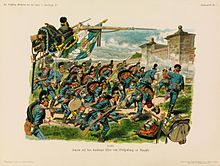The philosophy of a Prussian General towards training junior officers and its links for leadership in modern organisations....
When Elizabeth Consalvi asked if I could do a short piece for the newsletter I pondered what topic and angle could I consider which may be of interest to my very experienced and bright colleagues in the company.
The answer came by chance following a discussion on a leadership seminar I ran recently for the United Nations in Gaza. It gave me the chance to combine 2 of my passions; Leadership development (my profession and life’s work) and military history (my hobby). During the discussion I was reminded of a word I had seen on the white board of the personnel director of a large regulatory organization in London. It caught my eye and I had asked him to explain why it was in his office.
The word which brings these together is “AUFTRAGSTAKTIK” which in English means “ Mission-type tactics”.

This approach was developed by the Prussian General Von Moltke ( The Elder 1800 to 1891) in the mid 19th century and finally formalized as the key element for training in the German army via the manual published in 1888. At its heart was his dictum that - “as a rule an order should contain only what the subordinate for the achievement of their goals cannot determine on their own”
It took Von Moltke over 30 years to gain acceptance for this philosophy. But as this was the Prussian (then the German army ) maybe this should not be a surprise. As the renowned British military historian Basil Liddell Hart said - “The only thing harder than getting a new idea into a military mind is getting an old one out.”
Core to this way of operating was the belief that training junior officers should focus on building self-confidence, developing independent thinking and embedding a strong sense of responsibility. Trainee officers should not be denigrated and the example set by the teaching officers as role models should be exemplary.
Following this style and approach to training officers would then be best placed to be successful in battle. After explaining the military objective to junior officers they and their troops would be empowered to achieve it the best way they thought possible using front line information, on site judgment, their experience and knowledge, flexibility and commitment.
Many military historians consider the German army from the 1860s through to WW2 to have been the most effective of all contemporary major national fighting forces at a tactical level. (This is not to be confused with disastrous German strategic decisions such as making war on the Soviet Union and USA at the same time or the inflexibility and over-involvement in detail of the Army high command).
Key to this was both the philosophy and the rigorous supporting training. As the Russian Generalissimo Alexander Suvorov said - “Hard in training, easy in battle.”
And so what for organisations in the 21st Century?
The links for leadership in modern organisations are clear once one gets beyond any mental interference caused by considering a military example.
The strategic level is rightly the responsibility of Directors and senior leaders entrusted with the purpose, direction and priorities of the organization. But in order to enact this we need to create and sustain a high performing, innovative and agile workplace where the leadership mindset, climate and behaviours are those which enable the modern (tailored) equivalent of Auftragstactic to flourish.
We all as consultants know that micro management, bureaucracy, detailed levels of authority, a blame culture, an under focus on developing people’s capability and confidence as “the task “ for leaders can combine to stifle engagement and achievement within organisations.
The mindset flowing from learning from Auftragstaktik requires emphasis on sharing the bigger context, rigourous hard and soft skills training and development, a climate of appreciative improvement, confidence from leaders and staff and above all mutual trust.
It goes way beyond mere delegation of task to a truly empowering and liberated culture where employees and the organization have the expectation and opportunity to thrive.

[The Late] Ian Lawson, Liveryman
Director, Leadership Works Ltd and Principal Consultant
Cass Centre for Charity Effectiveness